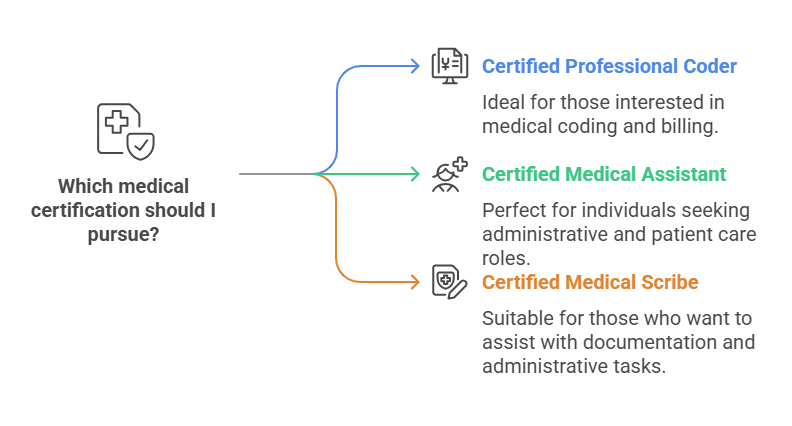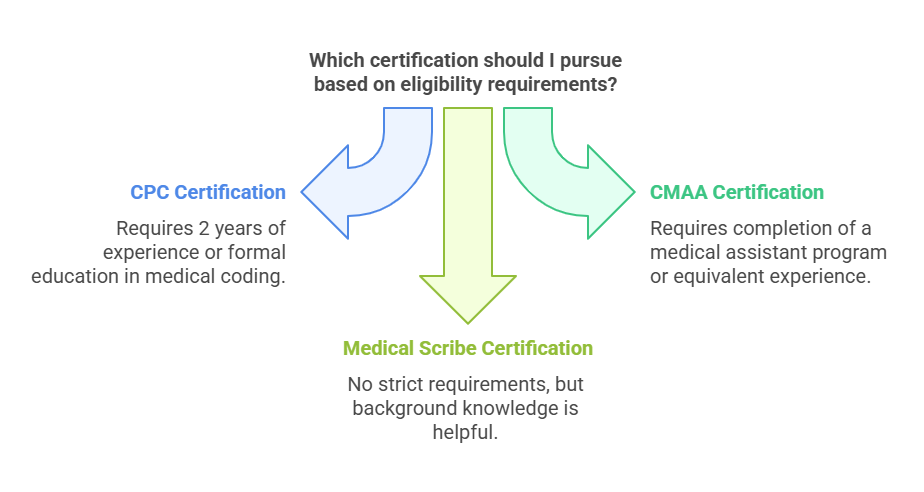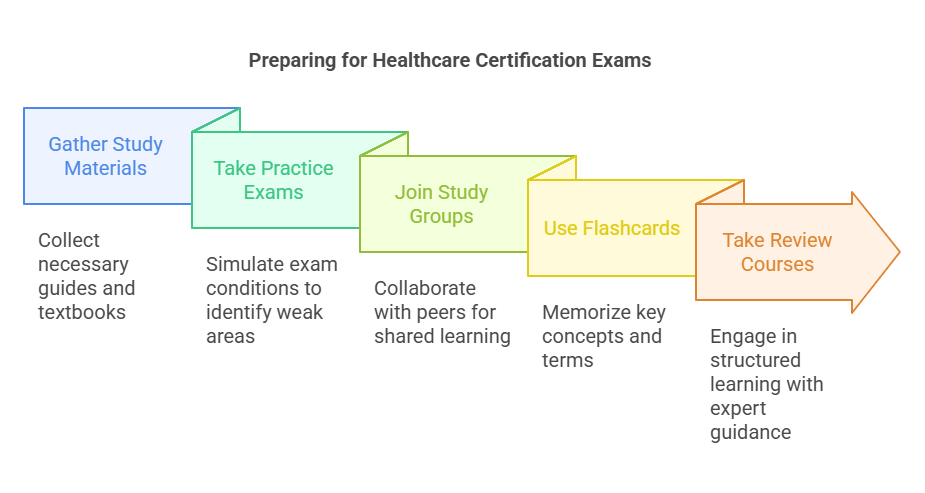How to Get Certified as a Professional Medical Expert
Becoming a certified professional medical expert opens up many career opportunities, enhances your skill set, and allows you to make a positive impact in healthcare. Whether you're interested in medical billing, medical assisting, or becoming a certified medical scribe, certifications are essential for professional growth. This step-by-step guide will help you navigate the certification process, including popular certifications like Certified Professional Coder (CPC) and Certified Medical Administrative Assistant (CMAA). We'll also discuss the top certifying bodies, exam preparation tips, and the importance of continuing education and recertification.
Step-by-Step Guide to Certification
Becoming a certified medical expert can significantly enhance your career prospects, improve your skills, and make you a valuable asset to healthcare organizations. Here’s a more detailed breakdown of how you can achieve certification in a medical field, ensuring you take the right steps toward achieving your goals.
Identify the Right Certification for You
The first and most crucial step in becoming a certified medical expert is identifying the certification that aligns with your professional interests and career aspirations. There are a variety of certifications that cater to different roles within the healthcare system. Understanding the duties and responsibilities tied to each certification will help you determine which one is the best fit for you.
Certified Professional Coder (CPC): This certification is ideal for those who are interested in working with medical codes used for billing, insurance claims, and coding in medical records. CPCs play a vital role in ensuring that healthcare services are properly coded for reimbursement and compliance with healthcare regulations.
Certified Medical Assistant (CMAA): For individuals who want to become medical assistants, the CMAA certification is a perfect fit. CMAAs support healthcare providers with a range of administrative tasks, such as managing patient records, scheduling appointments, and processing insurance claims. This certification also helps in gaining expertise in handling patient care and medical office protocols.
Certified Medical Scribe Certification: Medical scribes assist physicians with documentation and administrative tasks. This certification is especially beneficial for those interested in becoming an integral part of a healthcare provider’s team by helping to transcribe notes, organize patient data, and improve the efficiency of medical record-keeping.
Each certification has its own set of requirements, so it's important to research and select one based on your career goals, interest, and future prospects. Whether you are inclined toward clinical or administrative roles, there is a suitable certification for everyone.
Meet Eligibility Requirements
Once you’ve identified which certification you want to pursue, the next step is ensuring you meet the eligibility criteria for that particular exam. The eligibility requirements vary from certification to certification, and understanding these prerequisites is essential before you apply for the exam.
For example:
CPC Certification: To qualify for the CPC exam, you need a solid foundation in medical coding. The requirement typically includes two years of experience or formal education in coding. However, AAPC also offers training programs to help you acquire the necessary experience.
CMAA Certification: To qualify for the CMAA exam, candidates are typically required to have completed a medical assistant program or have equivalent hands-on experience in medical office administration. Some programs allow you to gain the necessary skills while studying for the certification exam.
Medical Scribe Certification: For medical scribes, there are no strict eligibility requirements, though it is helpful to have background knowledge in medical terminology, anatomy, and clinical workflows. Many training programs are available to equip you with the skills needed for this role.
It’s important to verify each certification's requirements on the respective certifying body’s website to ensure you’re eligible to take the exam.
Choose a Certifying Body
Choosing the right certifying body is one of the most important decisions in the certification process. A certifying body is an organization that validates your expertise by offering exams and issuing certifications. It’s vital to select a certifying body that is well-respected and recognized within the healthcare industry to ensure your certification is credible and accepted by employers.
AAPC (American Academy of Professional Coders): AAPC is widely regarded as one of the leading organizations for medical coding certification. Their CPC certification is highly respected and provides vast opportunities in medical coding, billing, and auditing.
AMT (American Medical Technologists): AMT offers the CMAA certification for medical assistants, providing an excellent pathway into administrative roles in healthcare settings. AMT is known for its credibility and provides detailed training programs to ensure candidates are fully prepared.
ACMSO (ACMSO Certification): ACMSO is recognized for offering Medical Scribe Certifications. Their training programs are designed to provide an in-depth understanding of medical scribing and documentation, making it easier for professionals to assist physicians with accurate and efficient documentation.
Each certifying body offers tailored training programs and certification exams. It’s important to choose one that best aligns with your goals and ensures recognition across healthcare institutions.
Complete Required Training
Completing the required training is essential to successfully passing the certification exam. Some certifications, like CPC, require specialized courses in medical coding, while others, such as CMAA and medical scribe certifications, often have comprehensive training programs that cover both theoretical and practical aspects of the role.
Many certifying bodies provide detailed courses, study guides, and workshops to help you prepare for the exam. These training programs may include:
Textbooks and Study Materials: These resources provide the foundational knowledge needed to succeed in your exam. Medical terminology, coding systems, administrative protocols, and regulatory compliance are often key areas of focus.
Online Classes and Workshops: Most certifying bodies offer online classes and workshops that provide flexibility in terms of location and timing. These workshops often include mock exams and practice questions to ensure you are well-prepared.
Internships or Clinical Experience (if applicable): For certifications like CMAA, some programs may require clinical or administrative practice as part of the training. This helps you gain real-world experience before taking the exam.
By completing the necessary training, you can ensure that you are not only ready for the exam but also have the knowledge to excel in your role as a certified medical professional.
Register and Take the Exam
After you’ve completed your training, it’s time to register for your certification exam. Certification exams are typically offered online or at designated testing centers. It’s essential to understand the format of the exam and the type of questions that will be asked.
Before you register for the exam, consider the following:
Exam Format: Make sure you understand whether the exam is multiple choice, written, or practical. Different certifications have different formats.
Practice Exams: Many certifying bodies offer practice exams to simulate the actual test environment. These practice tests can help you familiarize yourself with the structure of the exam and identify areas where you may need more focus.
Exam Schedule: Ensure you know the available exam dates and registration deadlines. Some certifying bodies may also offer remote testing, making it more convenient for you.
Once you are registered, take some time to review all study materials before the exam day. Adequate preparation and confidence in your knowledge will increase your chances of passing and earning your certification.
Top Certifying Bodies and Their Credibility
In the healthcare industry, certifications not only validate your knowledge and expertise but also open doors to better job opportunities, promotions, and higher earning potential. Several certifying bodies are recognized for their credibility in providing certifications across various healthcare professions. Here, we explore three of the most respected organizations and the certifications they offer:
AAPC (American Academy of Professional Coders)
The American Academy of Professional Coders (AAPC) is one of the most prestigious certifying bodies in the medical coding and billing field. AAPC is renowned for its rigorous certification programs and its ability to offer credentials that are highly recognized by healthcare employers, insurance companies, and regulatory bodies. AAPC's certifications, particularly the Certified Professional Coder (CPC) and Certified Professional Coder – Hospital (CPC-H), are among the most sought-after in the healthcare industry.
CPC Certification: The CPC is ideal for professionals aiming to work in medical coding, billing, and reimbursement. It requires extensive knowledge of medical terminology, ICD-10-CM codes, CPT codes, and HCPCS codes, among others.
CPC-H Certification: The CPC-H focuses on the specific coding requirements and challenges of hospital settings, including inpatient and outpatient services, making it essential for those aiming to work in hospital administration and billing.
AAPC’s certifications are not only recognized by employers but are often required for professionals working in coding and billing roles, ensuring that you’re equipped to handle the complexities of healthcare reimbursement systems. These certifications often translate into higher salaries and job security, which makes AAPC one of the most respected certifying bodies in the healthcare sector.
AMT (American Medical Technologists)
American Medical Technologists (AMT) is another respected certifying body known for offering credentials in a range of healthcare roles, including medical assisting, phlebotomy, and laboratory technology. AMT’s certifications, such as the Certified Medical Administrative Assistant (CMAA) and Registered Medical Assistant (RMA), are highly regarded by employers across the nation.
CMAA Certification: The CMAA is designed for individuals seeking administrative roles in healthcare, including managing patient records, scheduling appointments, and assisting with billing. This certification is recognized widely by hospitals, medical clinics, and private practices.
RMA Certification: The RMA certification focuses on the clinical side of medical assisting, providing expertise in patient care, medical office procedures, and laboratory techniques. It’s a highly respected certification that enables individuals to work effectively in both administrative and clinical settings.
AMT’s certifications have earned recognition for their comprehensive training and the flexibility they offer healthcare professionals looking to advance their careers. Their credibility in the industry ensures that AMT-certified professionals are in demand across a wide range of healthcare organizations.
ACMSO (ACMSO Certification)
The ACMSO (ACMSO Certification) is a leading organization in the field of medical scribing. Known for its Medical Scribe Certification, ACMSO offers in-depth training and certification that prepares individuals to assist healthcare providers with documentation, ensuring accurate and complete medical records.
Medical Scribe Certification: The Medical Scribe Certification is an excellent choice for individuals looking to combine administrative duties with clinical exposure. Medical scribes work alongside physicians and healthcare providers, documenting patient encounters in real time. ACMSO’s certification program is known for its comprehensive approach, ensuring that professionals are well-prepared to manage the documentation process efficiently.
ACMSO’s Medical Scribe Certification is highly respected by hospitals, clinics, and physician offices, where the demand for trained scribes continues to grow. The certification ensures that candidates are proficient in medical terminology, anatomy, and medical documentation software, making them valuable members of any healthcare team.
How to Prepare for Exams
Preparing for healthcare certification exams requires a structured and strategic approach. While each certifying body provides specific resources and study materials, there are common steps you can follow to ensure success:
Review Study Materials
Begin by gathering study guides, textbooks, and official preparation materials from your certifying body. Study guides are often available for purchase through certifying bodies like AAPC, AMT, and ACMSO. These materials are designed to cover all the topics that will appear on the exam. Focus your efforts on areas where you feel least confident.
Take Practice Exams
Many certifying bodies offer practice exams that simulate the actual certification tests. Taking these exams will familiarize you with the format and types of questions, helping you understand what to expect. Practice exams can also highlight areas where you need further review, so you can focus your efforts on weak spots.
Join Study Groups
Study groups, both online and in-person, provide a collaborative way to prepare for exams. These groups allow you to discuss complex topics, share resources, and gain insights from peers who may have experience with the exam process. Online forums and social media groups are excellent platforms to engage with others preparing for the same certification.
Use Flashcards
Flashcards are an effective tool for memorizing medical terms, coding systems, and other key concepts. Consider creating a set of flashcards or using online platforms like Quizlet to reinforce your knowledge. Flashcards can be particularly helpful for remembering details like ICD-10 codes or medical terminology.
Take Review Courses
Many organizations offer review courses, either in-person or online, to help you thoroughly prepare for your certification exam. These review courses often include practice questions, interactive lessons, and personalized guidance from experts. Review courses can help you feel more confident going into the exam.
Continuing Education and Recertification
Healthcare certifications typically require ongoing education to ensure professionals remain up-to-date with industry standards and changes in healthcare regulations.
Continuing Education Units (CEUs)
Certifying bodies require certified professionals to earn Continuing Education Units (CEUs) regularly. CEUs are obtained by attending workshops, conferences, webinars, or taking online courses. This ensures that healthcare professionals stay current with medical advancements, new technologies, and changing regulations.
Recertification
Recertification is an essential part of maintaining your certification. Many certifying bodies require professionals to renew their credentials every 2-5 years. The process of recertification often involves earning a set number of CEUs and possibly passing an exam or submitting a renewal application. This ensures that certified professionals continue to meet the evolving needs of the healthcare industry.
Comparison of Certifications and Their Career Value
When choosing a certification, it’s essential to understand how it will impact your career.
CPC Certification: Highly regarded in medical coding, the CPC certification offers opportunities in medical billing, auditing, and insurance. It can lead to higher salaries and job security in both private and public sectors.
CMAA Certification: Ideal for those pursuing administrative roles, the CMAA opens up positions in medical office management, patient coordination, and healthcare administration. The demand for certified medical assistants continues to rise, especially in private practices and healthcare organizations.
Medical Scribe Certification (ACMSO): Medical scribes play a critical role in the efficient operation of healthcare facilities. With ACMSO’s Medical Scribe Certification, professionals can gain opportunities in hospitals, outpatient clinics, and physicians’ offices, combining administrative work with clinical exposure.
Conclusion
In conclusion, becoming a certified medical expert is a rewarding journey that enhances your career and provides numerous opportunities for growth. Whether you choose to pursue certifications in medical coding, assisting, or scribing, the skills and knowledge gained will set you apart in the competitive healthcare industry. At ACMSO, we offer comprehensive Medical Scribe Certifications that provide high-quality training and recognition, enabling you to excel in your career.
Lesser-Known Facts About Medical Certification
Medical certification opens doors internationally. Many certifications are recognized globally, making it easier to work abroad. For example, the Certified Professional Coder (CPC) certification from AAPC is recognized by many international healthcare organizations, allowing professionals to seek opportunities abroad. AAPC's International Recognition provides insight into this global recognition.
CPCs can work in various industries. While most CPCs work in healthcare, their skills are transferable to insurance, auditing, and government sectors. CPCs are skilled in coding, reimbursement processes, and compliance. For more on the career opportunities available to CPC-certified professionals, see Job Opportunities for CPC Professionals.
Medical scribes are in high demand. The rise of electronic health records (EHR) has led to a surge in demand for certified medical scribes. According to a report from ScribeAmerica, medical scribes are crucial in improving the efficiency of medical practices by documenting patient encounters in real-time. Learn more about the demand for medical scribes in ScribeAmerica's Insights.
CMAA professionals may handle both clinical and administrative duties. The Certified Medical Administrative Assistant (CMAA) certification allows professionals to manage patient care tasks as well as administrative duties like managing appointments, handling medical records, and processing insurance claims. For details on CMAA duties and job roles, visit AMT's CMAA Certification Overview.
Recertification often involves earning a specific number of CEUs. Many certifying bodies require professionals to earn Continuing Education Units (CEUs) to maintain their certification. CEUs can be earned through various online courses and workshops. More information on CEUs and their importance can be found at AAPC's Continuing Education.
Online courses for certification are often more affordable than in-person options. Many certifying bodies offer affordable online courses for exam preparation, which makes earning your certification more accessible. For example, AAPC offers various online training programs that are budget-friendly. Explore AAPC's online training programs at AAPC Online Training.
Many healthcare employers cover certification exam fees for their staff. Many hospitals and healthcare employers support their employees in obtaining certifications by covering exam fees. The National Healthcareer Association (NHA) provides examples of employers supporting certification in NHA Certification Support.
Medical certification can increase earning potential. Earning a medical certification can significantly increase your earning potential. According to the U.S. Bureau of Labor Statistics (BLS), certified medical professionals, such as medical coders and administrative assistants, tend to earn higher salaries compared to non-certified counterparts. Learn more about the salary benefits of certification from the BLS Healthcare Salaries.
Certifications often require passing exams with a score of at least 70%. Most certification exams require candidates to score at least 70% to pass. This ensures that the certified professionals are well-equipped with the necessary knowledge to excel in their fields. For example, AAPC’s CPC exam passing rate is a crucial benchmark. See more details on the CPC Exam Requirements.
The process of certification can take anywhere from several months to a few years. The timeline for earning a certification varies depending on the type of certification and the candidate’s prior experience. Some certifications, like the CMAA, can be earned in as little as six months, while others may take longer, such as the CPC certification, which might take up to a year depending on your experience. Explore the timeline and preparation for certifications in AMT Certification Paths
FAQs
-
CPC focuses on medical coding and billing, while CMAA is more about administrative roles in healthcare, including patient management and office tasks.
-
The timeline varies depending on the certification, but most programs require anywhere from 6 months to 2 years of study and training.
-
Some certifications require a formal degree or training program, while others accept experience or self-study.
-
Costs vary by certifying body and certification type. Expect to pay anywhere from $200 to $600 for exams and training.
-
Yes, most certifications require recertification every few years, often through continuing education.








